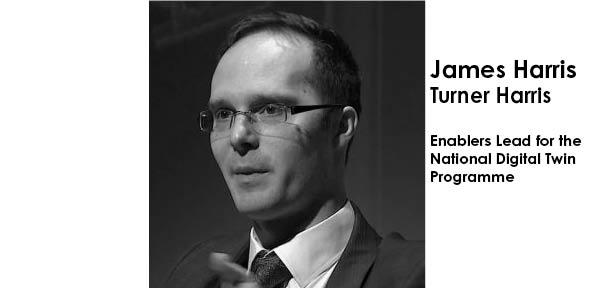
Submitted by Angela Walters on Fri, 22/11/2019 - 10:02
Following the appointment of Manchester-headquartered consultancy Turner Harris to lead the Enablers stream of the National Digital Twin (NDT) Programme, CEO James Harris, Enablers stream lead, is looking forward to grappling some of the key challenges to Digital Twin adoption.
In this, the first of what I hope will become a regular series of blogs for the Centre for Digital Built Britain, I’d like to take some time to introduce a newly-established and vital stream of work that has been initiated as part of the National Digital Twin Programme.
As background, while the potential benefits of the National Digital Twin are widely welcomed by industry, it’s perhaps no secret that the road to a new digitally-enabled world for our nation’s built environment is littered with some fairly significant hurdles – problems that at first glance look like locked doors with no key, or mazes of such labyrinthine complexity, they risk de-railing the changes we want to see made.
Some of these hurdles concern technology, but others are less tangible. Challenges such as resolving how the slow-moving worlds of finance, law and regulation come face to face with the rapid changes we’re making even now, and how the cultures and skills of our workplaces evolve as we widen adoption of digital twins.
The Enablers stream was established by the NDT programme to address such challenges. Its mission is to seek out the most pressing issues facing the adoption of the information management framework and Gemini Principles aligned digital twins in the UK, and to rally the charge in response. Our mission is to enable the outcomes and benefits we believe will emerge through a concerted national effort.
To do this, we will need to bring industry, academia, policy makers and global knowledge networks together to learn from each other and make targeted interventions and pragmatic commitments for change. We will need to understand what tools are currently in place, or need to be in place, to help these individuals and organisations in making that change.
We will also need to bring a wider range of sectors and industries closer to the heart of the programme. We need voices and lessons from a broad spectrum of experiences if we are to bring novel solutions to stubborn systemic problems.
And finally, we will need to make this rich seam of international knowledge and committed change available to support those organisations who are running our digital twin pilots in the Digital Twin Hub, such as Sellafield, Anglian Water, and others as they tread their path.
Someone has described the role of the Enablers stream to me as being the oil that greases the wheels of the wider NDT programme. I think that’s probably a good metaphor for the work we’re doing. On its own, the Enablers stream is of limited value. To extend the analogy I used earlier, what’s the point of opening a locked door if no-one is there to walk through it?
The work of the other NDT streams is to provide a framework for how information will be created, used, managed and exploited to make our built environment a better place for everyone. For more information, see our roadmap. Our job in the Enablers stream is to make the inception and deployment of that framework easier, faster and more predictable. Ushering them through the open door.
I’m looking forward to working with many of you over the next few months as we begin making our aspirations a reality – setting up our international knowledge forum (a leadership-oriented community for the sharing of lessons, case studies and best practice from around the world, specific to the digital twin) and scheduling the first in a series of leadership roundtable events focused on what commitments we must make if we are to solve the programme’s stubborn uncertainties.
I would encourage you all to consider how you might be able to play a part in this work and would be very pleased to hear from individuals and organisations who would like to contribute. Send an email to us at NDT-enablers@cdbb.cam.ac.uk to get in touch. In my next blog I will update you on progress against our plan and talk through some selected initial barriers we have identified for early response.
